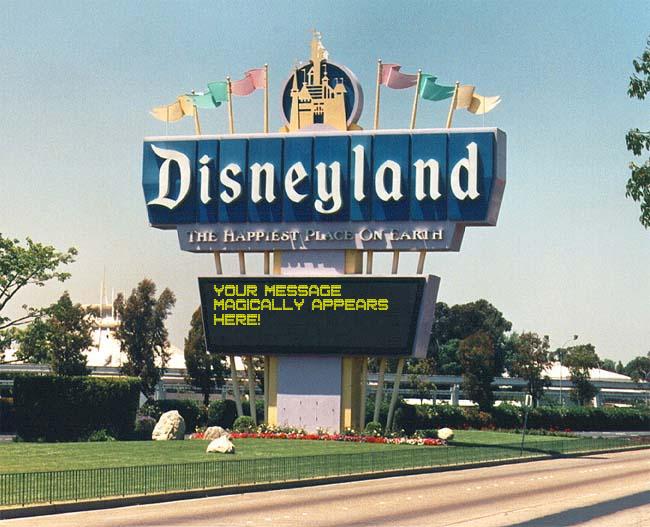 Exactly forty years ago today marks the summer of two events very unique to Americana. The single biggest year of expansion of what is perhaps Walt Disney’s greatest achievement took place: Disneyland. The summer of ’59 saw the revamp of Autopia and the additions of the Disneyland Monorail, Submarine Voyage, and the Matterhorn. That was in June. Also in 1959 was the first visit to America by the head of Communist Russia, Nikita Khrushchev, as the result of President Dwight Eisenhower’s invitation. And on this date, September 15, a chain of events was set into motion in which the two would collide. A recent article in Smithsonian Magazine put it this way:
Exactly forty years ago today marks the summer of two events very unique to Americana. The single biggest year of expansion of what is perhaps Walt Disney’s greatest achievement took place: Disneyland. The summer of ’59 saw the revamp of Autopia and the additions of the Disneyland Monorail, Submarine Voyage, and the Matterhorn. That was in June. Also in 1959 was the first visit to America by the head of Communist Russia, Nikita Khrushchev, as the result of President Dwight Eisenhower’s invitation. And on this date, September 15, a chain of events was set into motion in which the two would collide. A recent article in Smithsonian Magazine put it this way:
A few days before the premier’s scheduled arrival, the Soviets launched a missile that landed on the moon. It was the first successful moonshot, and it caused a massive outbreak of UFO sightings in Southern California. That was only a prelude to a two-week sojourn that historian John Lewis Gaddis would characterize as “a surreal extravaganza.
But the extravaganza got even more more surreal. Things got even funnier. As Ike read a welcoming speech, Khrushchev mugged shamelessly. He waved his hat. He winked at a little girl. He theatrically turned his head to watch a butterfly flutter by. He stole the spotlight, one reporter wrote, “with the studied nonchalance of an old vaudeville trouper.”
Khrushchev’s trip move from surreal into whatever level comes after surreal when he left the East for a trip out West. Keeping in mind that this era represented the peak of the US anti-communism bent, you can imagine the circus Hollywood became as Twentieth Century Fox planned a luncheon for Khrushchev and 200 of our biggest stars. According to the Smithsonian article, the studio was determined that Marilyn Monroe be on hand. And not only that, but she was told to wear “the tightest, sexiest dress she had” for the premier. Told that to most Russians, “USA” only meant “coca cola and Marilyn Monroe,” she agreed to make the trip from New York where she and husband Arthur Miller were then living. (When I read this I couldn’t help but wonder how many other times she had been blatantly directed to make herself a prop in this way. That had to have a profound and negative effect on a person with a decent level of depth.)
For one of the times in her career, Marilyn arrived early. Also on hand were Edward G. Robinson, Judy Garland, Shelley Winters, Gary Cooper, Kirk Douglas, Dean Martin, Tony Curtis, and Zsa Zsa Gabor. Henry Fonda purportedly had an ear plug in his ear listening to a Giants/Dogers game during the ’59 pennant race. The premier sat at the head table. Despite Hollywood’s red carpet, what the Soviet premier really wanted was a trip to Disneyland. (At least that’s what his wife apparently wanted.) This says so much about the human desire for fairy tale and story, I think. His request, however, was met with resistance due to security reasons. Khrushchev was informed that trip to Disneyland was canceled just prior to his turn on the platform at the Twentieth Century Fox luncheon. His wife, Nina, sat between Frank Sinatra and Bob Hope. Nina Khrushchev told Bob Hope that she wanted to see Disneyland, too. Peter Carlson in his article “Nikita Khrushchev Goes To Hollywood” describes the dictator’s reaction like this:
“Just now, I was told that I could not go to Disneyland,” he announced. “I asked, ‘Why not? What is it? Do you have rocket-launching pads there?’ ”
The audience laughed.
“Just listen,” he said. “Just listen to what I was told: ‘We—which means the American authorities—cannot guarantee your security there.’ ”
He raised his hands in a vaudevillian shrug. That got another laugh.
“What is it? Is there an epidemic of cholera there? Have gangsters taken hold of the place? Your policemen are so tough they can lift a bull by the horns. Surely they can restore order if there are any gangsters around. I say, ‘I would very much like to see Disneyland.’ They say, ‘We cannot guarantee your security.’ Then what must I do, commit suicide?”
Khrushchev was starting to look more angry than amused. His fist punched the air above his red face.
“That’s the situation I find myself in,” he said. “For me, such a situation is inconceivable. I cannot find words to explain this to my people.”
The audience was baffled. Were they really watching the 65-year-old dictator of the world’s largest country throw a temper tantrum because he couldn’t go to Disneyland?
So what was it about Disneyland, honestly, that might prompt such an outburst close to the height of the cold war? The expansion of 1959? I don’t think so. Such a strange event may find its roots in the notion that story and fairy tale have a unique and wonderful draw within the human condition.